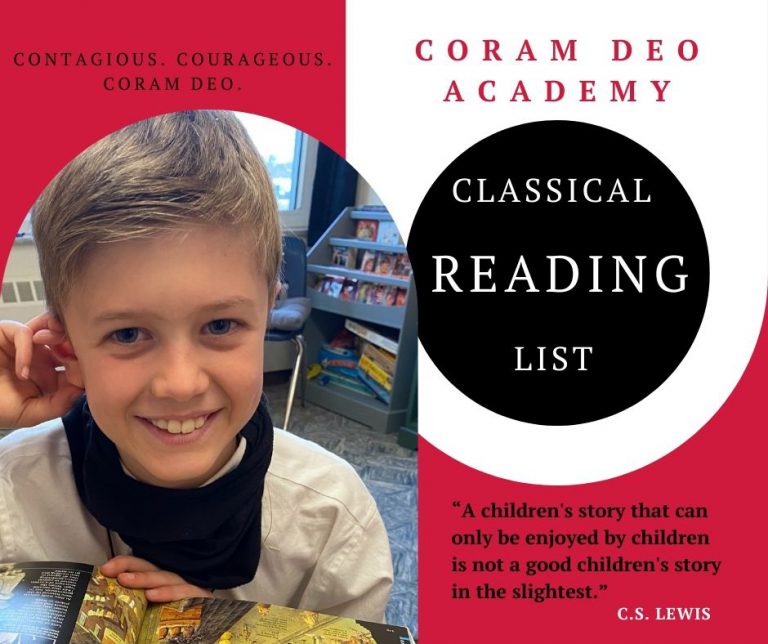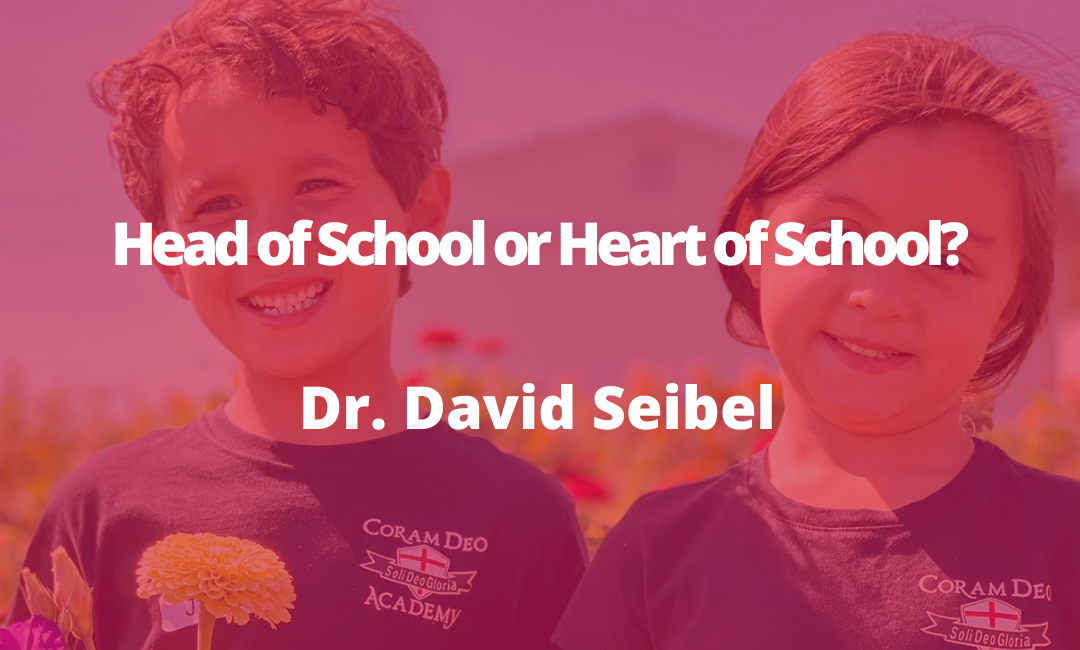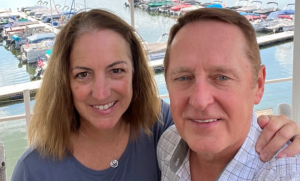by Dr. David Seibel, Head of School
I was recently talking to another headmaster, and she said she thought her title should really be “Heart of School.” I am not entirely sure why she thinks this, but she struck me as a nurturing type who really sees herself as the school’s caretaker. I, however, am pretty comfortable with the title ‘Head of School’ and would even accept ‘Hands of School,’ but I’m not sure how much ‘Heart of School’ really fits with my particular set of strengths. I see myself more as the school’s risk-taker, not caretaker, and I am charged with making sure that qualified caretakers are in the right spots at the right time and in the right ways. It’s not that I don’t aspire to be great at developing Christian community and bringing people together, I’m just comfortable with my creaturely limitations, and I’m a believer that exceptional results come from collaborative leadership. Much of this thinking came about when I was completing my doctoral dissertation on Ichak Adizes’s theory from 2020 to 2022.

While completing a church internship in 2017, I learned about the work of Dr. Ichak Adizes in the field of leadership and organizational life cycles. The pastor I was serving with drew insights from Adizes’s books to better understand how our congregation could grow and multiply. That church now has over 1,000 people across three congregations, but it all started with a few leaders meeting in the pastor’s living room on the Northside of Indianapolis. I remember finding the Adizes paradigm fascinating and even asked about Coram Deo’s lifecycle stage during my interview process at Coram Deo Academy in 2018. Fast-forward to December 2022, and I graduated with my Doctorate of Education from the Southern Baptist Theological Seminary, and my dissertation was entitled, “ICHAK ADIZES’S ORGANIZATIONAL THEORY APPLIED TO THE CLASSICAL CHRISTIAN EDUCATION MOVEMENT: A MULTIPLE CASE STUDY.” When my father read the title, he looked at me cock-eyed and said tongue-in-cheek, “Sounds like a real page-turner, son.” This post will clarify the work I’ve done, the motivation behind it, how it’s been used at Coram Deo the past few years, and the intended impact on Coram Deo Academy and beyond.
#1 What is a Doctorate of Education, and why did I pursue it?
My daughter says to me, “Why should we call you a Doctor? You don’t know how to heal anybody!” In contemporary culture, we typically associate the title Doctor with medicine, but in the Middle Ages, a Doctor was entrusted primarily with the Doctrines of the Church and the care of souls, not the body. The word doctor is derived from the Latin verb, “docere,” meaning to teach. A doctor was equipped to deal with the matters of the soul. My personal interest is in tending to the soul of classical Christian educational institutions. The modern Doctorate of Education, or EdD, is a terminal degree (the highest degree in a given discipline) awarded to those equipped to serve in the leadership of educational institutions. The EdD differs from the PhD, Doctor of Philosophy, in that it was created for those who aim to be scholar-practitioners serving within institutions as opposed to scholars serving within classrooms in Higher Education and conducting professional research.
The main two reasons I pursued this degree were that 1) I just really wanted to, and 2) I knew it would help Coram Deo Academy go from being a K-8 to a K-12 (or K-14). I wanted to keep learning and writing for the same reason that a dog barks – I couldn’t not. However, I do agree with GK Chesterton who wrote, “Without education we are in a horrible and deadly danger of taking educated people seriously.” Obtaining a terminal degree is not about becoming an oracle in an elite class, but about digging spiritual and intellectual wells that refresh and strengthen others. Whether someone gets a BA, MA, or EdD, the whole point is to contribute and give back to those in your discipline. My passion has been to tend to the soul of the classical Christian movement so that it goes on into the 22nd century and beyond.


#2 What does the work of Ichak Adizes have to do with classical Christian education?
In 2019, I read a dissertation entitled “Wisdom, Eloquence, and Academic Rigor in ACCS Schools: A Mixed Methods Study,” and I found out that the majority of classical Christian schools in the US were only K-8 but were designed to be K-12. By Winter 2019, it became my chief mission to understand why schools get stuck at K-8, because this was Coram Deo’s obstacle. When I inquired into the reasons for why these schools were not finishing what they started and only offering grades K-8, I got blank stares. Around that same time, I had also learned that the average tenure of headmasters in the classical Christian movement was about three years and most were untrained. By the time I joined the classical Christian movement, I had been involved with public schooling at three different schools, private schooling at another Christian school, and homeschooling. Upon joining and observing the classes at Coram Deo, I was 100% persuaded of the value of classical Christian education in the classroom, but I quickly became aware of ‘institutional intelligence’ issues within the classical Christian movement.
The reason I chose to study the administration and governance of classical Christian schools, as opposed to the philosophy and pedagogy, is because there seemed to be a need within the movement, and at CDA, and there was also no research published on the topic. I used a case study methodology and the Adizes management diagnosis to see how schools grew over time by working with a startup school, two K-8 schools, and three K-12 classical Christian schools.
Two books from Adizes formed my rubric for analyzing the institutional maturity of schools: The Ideal Executive and Managing Corporate Lifecycles. In 2004, Yugoslavian-American management consultant Dr. Ichak Adizes wrote The Ideal Executive: Why You Cannot Be One and What to Do About It. His thesis is simple: no individual leader or manager possesses all of the characteristics and competencies that are needed for any organization to reach its full potential. In the Adizes management framework, exceptional results come from complementary leadership where the chief executive functions like a thumb in harmony with the other fingers on the hand. More than a decade prior in 1990, Dr. Adizes published Corporate Lifecycles: How and Why Corporations Die and What to Do About It. His thesis is that organizations are like living organisms that develop according to predictable patterns and go through observable stages. At each of the six schools I analyzed, I did a one day focus group at each of the schools with a cross functional group (parents, teachers, admin, board) in order to gather their major problems and diagnose their stage in the school lifecycle. In the Adizes methodology, you understand a school’s lifecycle stage by the types of problems that they have. We do this intuitively. If I described a problem with my son, you could probably guess where he is in the ‘developmental life cycle.’ His problem is that he cannot sleep in his own bed, he cries when I want to sleep, he is always hungry, and he cannot go to the restroom on his own yet.’ That was a description of a two year old. I found that you can essentially do the same thing with schools.
#3 What are my major takeaways from the dissertation?
I could say a lot here, but I’ll boil it down to my three major takeaways:
- Exceptional results come from collaborative leadership.
- Problems are due to various groups of the school getting out of sync.
- Knowing the predictable life cycle stages helps provide realistic expectations.
My first takeaway has been that exceptional results come from collaborative leadership. Leadership is a team sport. I am not proposing a two quarterback system or a two-headed monster, but something more akin to a symphony conductor who succeeds by helping each musician play their individual instruments with excellence. Perhaps I should not have had to do a doctorate on this, because it is embarrassingly obvious, and even spelled out in plain language in Romans 12:4-5,
“For as in one body we have many members, and the members do not all have the same function, so we, though many, are one body in Christ, and individually members one of another.”
Paul here is describing that the body of Christ excels when it works in unison. A leader’s job is not to oppress the members of the body but bless the members of the body. We have this false egalitarian idea in our culture that all power is oppressive and that someone with the title ‘head of school’ could not possibly bring about flourishing. I met brilliant and godly people who bring out the best in their teachers, administrators, parents, and students.

When you look at some of Adizes’s major clients like Bank of America, Dominos Pizza, and Eastern European governments, his unique insight is really similar to that of the Apostle Paul: one person cannot do it all, because they do not have all of the gifts that are needed. Adizes is not against hierarchy, but he is against the hyper individualistic tendency of leadership in the West. In Western management theory, leadership is what one person does to another rather than with another. In the beginning years of a school, there is often more command and control leadership because there is not much complexity and there are just a lot of startup tasks. But as a school grows in complexity and diversity of constituency, leadership is more finesse and less force. It is less barbaric and takes the form of the synergist.
For anybody that has been at Coram Deo Academy, the benefits of having both a head of school and a principal have been really obvious. For anyone who knows Mr. Barney or myself, we have a lot in common, but we also have different gifts. God has given us each a set of unique colors in our palettes, but together, we can blend to make a new mosaic of colors and work together to find the best and brightest colors in teachers, staff, parents, and students. Most schools in the classical Christian movement avoid raising money and hiring for growth. They think of fundraising and hiring as necessary evils rather than opportunities for extending the life of the institution.
Healthy school cultures allow a variety of management styles to flourish under one agenda. Steve Jobs is a good contemporary example, because he had a way of bringing together both the aesthetics via his love for beauty, as well as the engineers through his emphasis on engineering. The best classical Christian school I visited was one that was led by an individual who excelled in bringing together complementary leadership styles. It was amazing that the school’s culture allowed the task-oriented leaders as well as the people-oriented leaders to flourish. She had created the conditions for lasting success at the school via a unique blend of people skills and institutional intelligence.

My second takeaway has been that problems come from disintegration and a lack of synchronization. It is the job of leadership to identify what is falling apart, or disintegrating, and how to put it back together. This happened to a lot of the schools post-covid that were not operationally prepared for the sudden increase in enrollment. In the same way that what happens in the nervous system might affect the digestive system, what happens in admissions affects teaching and learning. I initially thought you could diagnose a school’s overall lifecycle, but found out that you must first judge the quality of the subsystems of teaching and learning, marketing and admissions, fundraising and facilities, and finance and operations.
I found that a school could actually be ‘too mature for its own age’ in finance and operations, a fact which actually can arrest the development of other important functions of the school. For example, it is not uncommon to see a lawyer or an accountant or a doctor impose the professional standards of their industry on a fledgling classical Christian school and end up hindering the healthy growth of the school throughout its subsystems. The key is for the various groups and subsystems of the school to stay together despite all of the change that occurs (similar to Arctic penguins). For Coram Deo Academy, our focus in the “Building Upon the Rock” vision is developing internally rather than expanding externally. We have had two consecutive years of external expansion as well as a facility change. Deepening our roots and focusing on a solid foundation is our top priority.
My third takeaway is the importance of the life cycle for diagnosing and solving problems in a school. The life cycle for an appliance is about 10 years. Two years for a laptop and 18 months for a smartphone. Egypt is thousands of years old, but a butterfly only lives about a month before its life cycle expires. My alma mater was founded in 1832, but Coram Deo Academy is only in its 15th year. The oldest school in my dissertation was only 28 years old. In each of these schools, there is a movement over time from the simple to the complex. Every forest was first an individual seed and every constellation starts out as a single star. We often assume the root cause of certain problems is due to a person or a process or a structure, but often it is due to the life cycle.
One of the most common problems in classical Christian schools has been the founder’s dilemma where the founding generation of the school cannot hand over the reins to the next generation due to minor differences in style. Another common issue has been the lack of future-oriented entrepreneurial vision, because those in leadership are nurturers, but not visionaries. Many schools that are stuck at K-8 have a ‘heart of school’ but no ‘head of school.’ The difference between the heart and the head is vision. Both are critical, but certain moments in the life cycle are more dependent upon vision while others are more dependent upon nurturing relationships. The value of Adizes is that he wants to see the soul, the head, the hands, and the heart of a school all working in collaboration for the benefit of the next generation.
#4 How has this been used at Coram Deo, and how will it be used in the future?
In my research, I found that you can determine the overall maturity of the school by merely assessing the leadership team. In the same way that you can test a small sample of blood to evaluate the entire body, you can test an entire school by evaluating its leadership team. The leadership team is the one that is responsible for integrating the four systems of the school. When problems occur, the leadership team’s job is to identify what is falling apart, or falling out of sync, and identify an intervention to put it back together. I found that a leadership team needs to have these roles/styles present:

- Producer (P) – a purposeful achiever of results
- Administrator (A) – an efficient organizer of processes
- Entrepreneur (E) – a risk-taking visionary with ideas
- Integrator (I) – a careful harmonizer of people
While it is certainly possible for a leader to have strengths in two of the roles above, it is doubtful that they have three, and impossible that they have four. Remember, there is no such thing as the ideal executive. If you’re still reading up to this point, bear with me, because this is what gets exciting. I have found that I can usually relate to a problem that is presented to me by a parent. This is a shortcoming of the school’s leadership team. This is why I rejoice when problems are brought to me, because those areas of disintegration and desynchronization actually will show me if we are lacking in P, A, E, or I. At Coram Deo, we have historically been low on A, which is why we have valued accreditation and are expanding our administrative leadership team in 2023.
My dissertation is almost 200 pages long, but I hope this scratches the itch for those who were interested in what study I had done. I value that I can now see the curves in the road ahead on our pathway to perennial excellence as an Academy. To some degree, the Adizes language of PAEI exists at Coram Deo and I’ve also introduced the concept to teachers. For Christians, the potential aid comes in realizing that my way of seeing the school is probably not the only way of seeing the school. I naturally tend to judge a person by the quality of the ideas that they bring and the results that they achieve. However, I now have a lot more respect for people who excel in the process and the people. At the end of the day, the Adizes methodology helps me partner with people who have different strengths than me and even helps me take conflicts and leverage them for growth in resilience. It also causes me to see the value in what Paul said.
“If the whole body were an eye, where would be the sense of hearing? If the whole body were an ear, where would be the sense of smell?”
– 1 Cor 12:17





